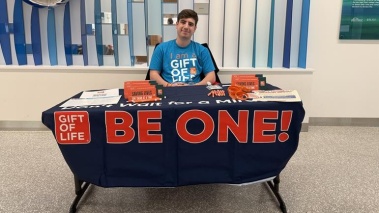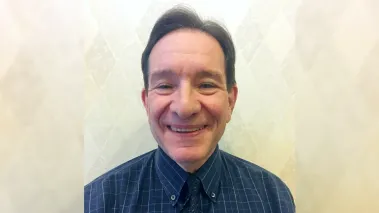Chien-Ching Li, PhD, MPH, is determined to smoke out obstacles to accessing lung cancer care.
Li studies how minorities in the United States understand their health and health challenges, and how well they are able to find, understand, use and afford health care services — from prevention and screening to treatment. He has a special interest in cancer prevention, particularly lung cancer, which is the deadliest cancer for Americans.
An associate professor of Health Systems Management in the College of Health Sciences at Rush University, Li began his career in public health in his native Taiwan, a largely homogeneous society with universal health care. He moved to the United States in 2006 because he wanted to learn more about health care in the U.S. and how public health works within the system to reduce health disparities and promote wellness. As he was studying for his master’s in public health at the University of Illinois at Chicago, he found the United States’ stark health disparities and astonishing array of cultures to be fertile grounds for research.
"Access to health care is a real problem for some minority populations, like African Americans, Hispanics and Chinese," says Li, who interned at Rush while earning his master’s. “Sometimes that's because the health care system isn't sensitive enough to the ways those groups' needs differ from others.”
Li went on to receive his PhD in public health studies with a concentration in health services research from Saint Louis University in St. Louis, Missouri, and returned to Chicago and Rush soon after.
“During my time as an intern, I was impressed with Rush’s health care delivery system, particularly its care for older adults,” Li says.
‘We have built trust in the community’
Among the groups Li studies are older smokers from mainland China, Hong Kong and Taiwan who now live in Chicago. For some studies, he has used data from the Population Study of Chinese Elderly in Chicago, or PINE, which was conducted by researchers at the Rutgers Institute for Health, Health Care Policy and Aging Research.
Among Li’s surprising findings is that older Chinese smokers are healthier overall than older former smokers. He speculates it may be because people quit smoking when their health begins to fail, but he says researchers are going to have to investigate further before they can say for sure.
Li's team also has been gathering its own data. At first, they tried to get the word out about their work with flyers they handed out on the street in Chicago's Chinatown, but the response was disappointing. Then they began working with community groups that offer workshops and other events for older Chinese Americans.
"The people trust those organizations,” Li says. “Working with them, we have built trust in the community. We're getting more and more people to participate."
Li’s team conducts focus groups with older Chinese American smokers. "They all know smoking is not good for them, but they can't quit," he says.
Many even know that second-hand smoke can cause severe health problems for their loved ones, including increased rates of lung cancer, other lung diseases, stroke and heart disease. Family support is essential to quitting, but that's often not enough, Li says. Smokers may need to get professional smoking cessation help.
Older smokers should also take advantage of cancer screening, which, if they have certain risk factors, may be covered by Medicare or private insurance.
"Lung cancer screening is important," says Li, whose interest in the topic stems partly from his own family's complex history with cancer associated with smoking.
The five-year survival rate is 57 percent if the disease is caught while it's still localized in the lungs. But even if smokers are willing to quit or are interested in screening, accessing the health care system can be difficult. Most older Chinese in Chicago are not affluent, and more than 90 percent don't speak English well. American institutions can be bewildering to them, and again trust can be an issue.
An additional factor is the streak of fatalism in Chinese culture, which causes some Chinese to view the bad things that happen to them as unavoidable. By analyzing PINE data, Li and his colleagues found that all these factors can contribute to their not getting the health care they need.
Battling disparities with data
Similar problems affect other minority groups in the U.S. Residents of the poor, black Austin neighborhood on Chicago's West Side have a life expectancy of 69 years. That’s a significant difference compared with the 85 years a resident of Chicago’s Loop can expect to live.
One reason for this health disparity is smoking, the chief preventable cause of death in the United States. Smoking is a factor in 87 percent of lung cancer deaths, and some groups are at a higher risk than others.
For example, black men have higher rates of lung cancer and are more likely to die from the disease than any other group. However, their smoking habits differ from those of other groups in ways that may make it hard for them to get their health insurance to cover low-dose computed tomography, or LDCT, a type of lung cancer screening that has been shown to reduce lung cancer deaths among smokers by 15 to 20 percent. LDCT screening may be covered by insurance for older people with certain risk factors.
Li and colleagues at Rush and UIC looked at data gathered as part of the University of Michigan’s ongoing Health and Retirement Study and were able to show that older black male smokers have a longer smoking duration but typically smoke fewer cigarettes — in a day, a year and in a lifetime — than other smokers. That characteristic causes them to be less likely to meet the 30-plus pack years smoking history threshold established as a primary eligibility standard for lung cancer screening. (Pack years is a measurement calculated by multiplying the average number of packs of cigarettes a person smokes each day by the number of years he smoked).
Li says the current guideline for LDCT lung cancer screening should be revisited to include other criteria that will flag black smokers at risk for lung cancer so that they can receive LDCT screenings.
"We can't just look at pack years," he says. “There’s so much more to take into account, and that’s where research can play a vital role.”






